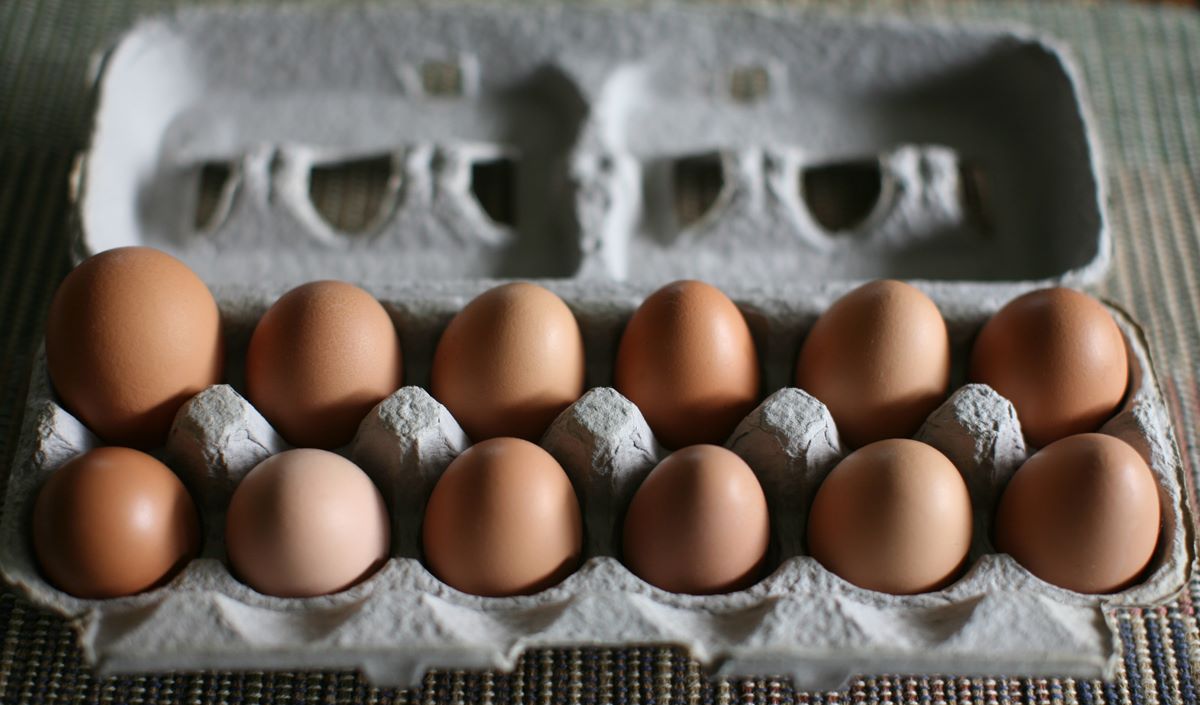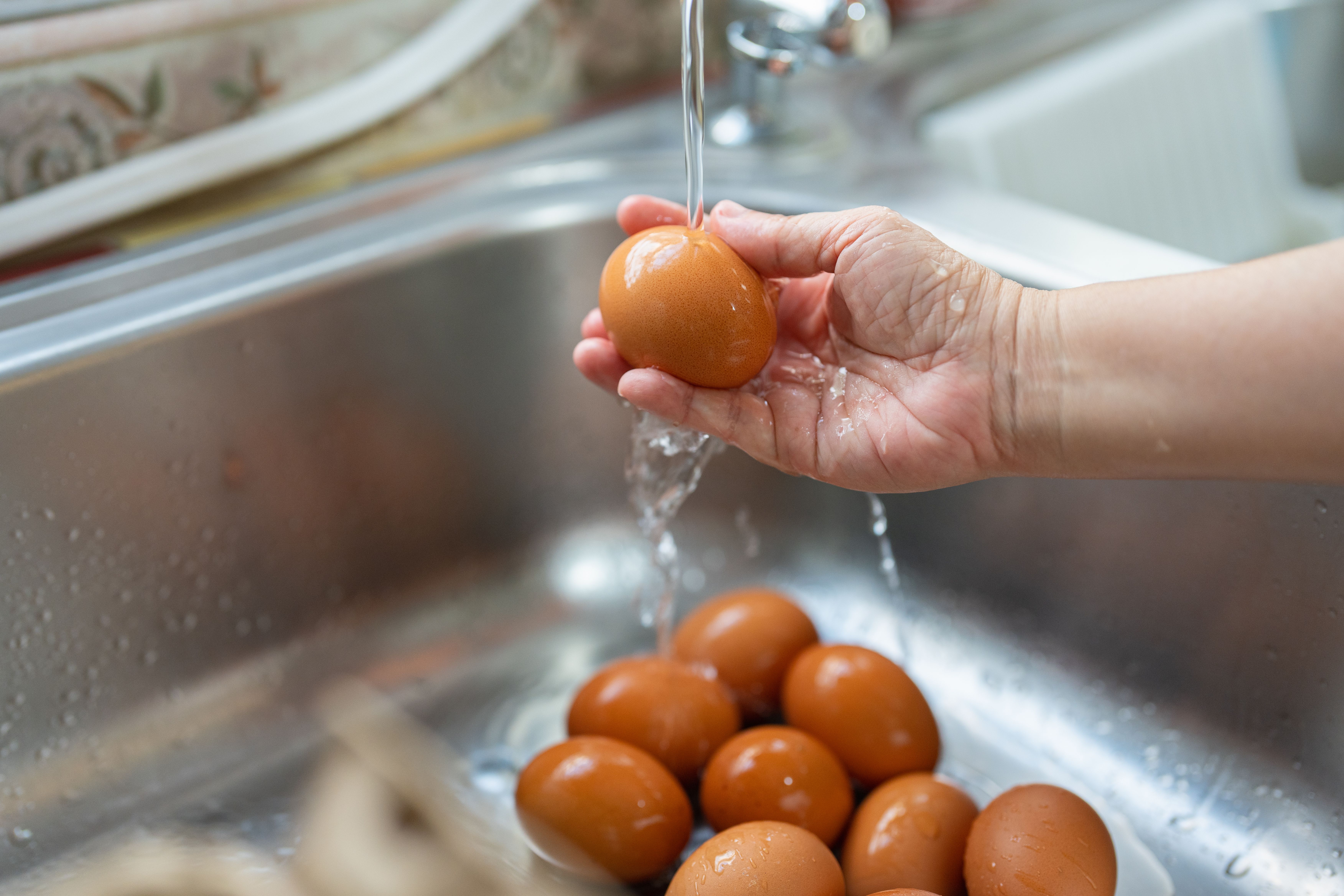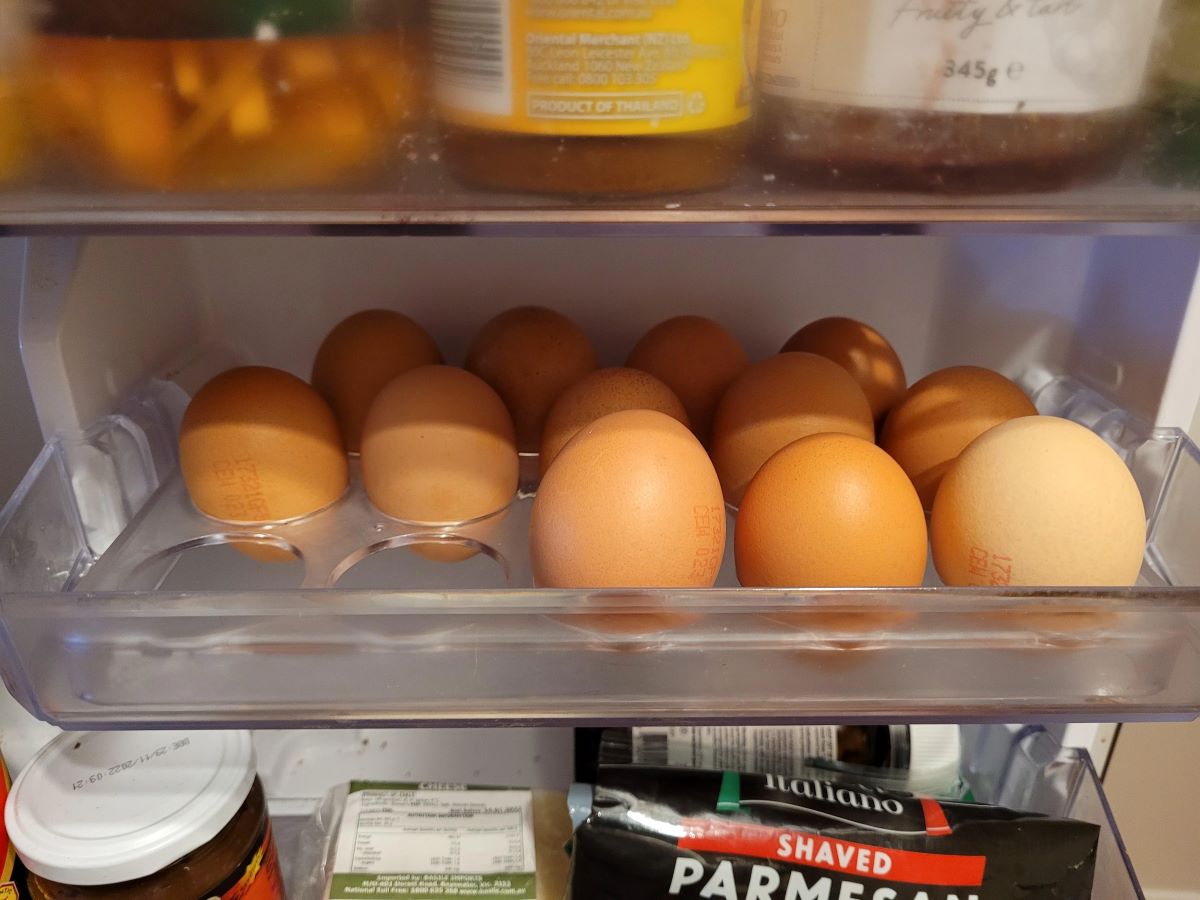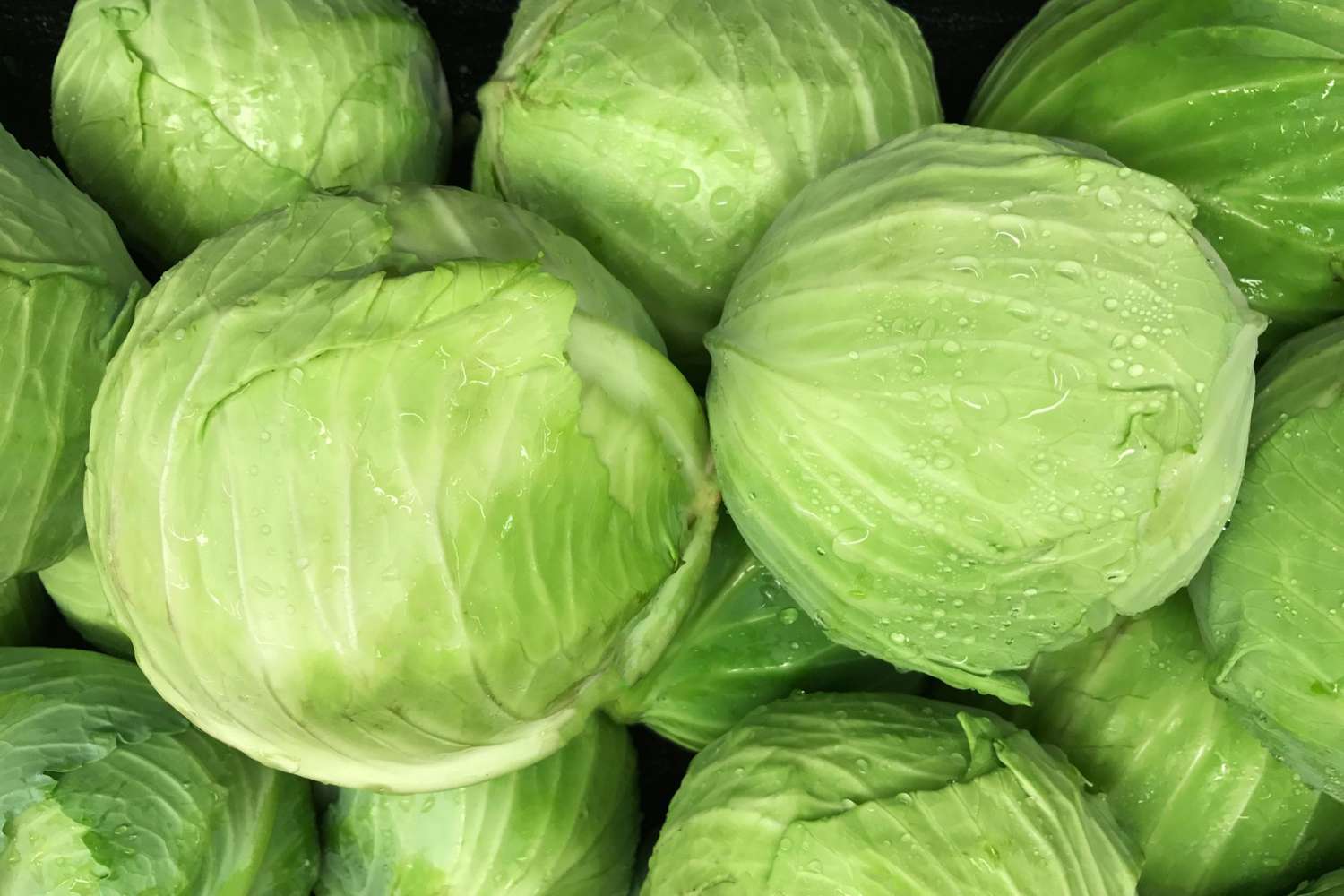

Articles
How To Store Fresh Eggs Without Refrigeration
Modified: October 20, 2024
Discover the best methods for storing fresh eggs without refrigeration in this informative article. Learn how to keep your eggs fresh and delicious for longer periods.
(Many of the links in this article redirect to a specific reviewed product. Your purchase of these products through affiliate links helps to generate commission for Storables.com, at no extra cost. Learn more)
Introduction
Storing fresh eggs without refrigeration might seem unconventional in our modern age of advanced technology, but it is a practice that has been employed for centuries. Before the invention of refrigeration, people had to rely on alternative methods to preserve eggs for longer periods of time.
There are various reasons why you might want to store fresh eggs without refrigeration. Perhaps you have a surplus of eggs from your backyard chickens or a local farm, or you simply prefer to live a more sustainable lifestyle by minimizing energy usage. Whatever the reason, it is important to understand the factors to consider and the methods available to safely store fresh eggs without refrigeration.
In this article, we will explore the reasons why you might choose to store fresh eggs without refrigeration and discuss the factors you need to keep in mind before embarking on this endeavor. We will also explore six different methods that you can use to successfully preserve and store fresh eggs without relying on a refrigerator.
So, if you’re ready to explore the fascinating world of alternative egg preservation methods, read on to discover how you can store fresh eggs without refrigeration and ensure the longevity of your eggs in a safe and effective manner.
Key Takeaways:
- Embrace sustainable living and reduce energy consumption by exploring alternative methods to store fresh eggs without refrigeration. From egg preservatives to traditional European techniques, there are plenty of options to extend the shelf life of eggs.
- Whether you have a surplus of eggs, live off the grid, or want to be prepared for emergencies, mastering the art of storing fresh eggs without refrigeration can be a rewarding and practical skill. Experiment with different methods and enjoy the taste and convenience of fresh eggs, even without a refrigerator.
Read more: How To Store Eggs Without Refrigeration
Why Store Fresh Eggs Without Refrigeration?
The idea of storing fresh eggs without refrigeration may seem counterintuitive in a world where refrigerators are a common household appliance. However, there are several reasons why you might consider alternative methods for egg storage:
- Sustainability: By storing eggs without refrigeration, you can reduce energy consumption and contribute to a more sustainable lifestyle. Refrigerators require a significant amount of electricity to operate, and by finding alternative ways to store eggs, you can minimize your carbon footprint.
- Egg surplus: If you have a backyard flock of chickens or access to fresh eggs from a local farm, you may find yourself with more eggs than you can consume quickly. Storing them without refrigeration allows you to preserve the surplus and ensures that none of those precious eggs go to waste.
- Off-grid living: Those who live off the grid or in remote locations may not have access to reliable electricity or refrigeration. Knowing how to store eggs without refrigeration can be crucial in these situations to ensure a sustainable food supply.
- Emergency situations: Disasters or power outages can disrupt the electricity supply and render refrigerators useless. Being able to store eggs without relying on refrigeration can be invaluable in these circumstances, ensuring a stable food source during emergency situations.
While refrigeration offers a convenient and reliable way to store eggs, considering alternative methods can be beneficial in various scenarios. The following sections will discuss the factors you need to keep in mind when storing fresh eggs without refrigeration and the different methods available to ensure their optimal preservation.
Factors to Consider Before Storing Fresh Eggs Without Refrigeration
Before storing fresh eggs without refrigeration, it’s important to consider certain factors to ensure the safety and quality of the eggs. Here are some key factors to keep in mind:
- Egg freshness: Freshness is crucial when storing eggs without refrigeration. Choose eggs that are as fresh as possible, preferably within a week of being laid. Fresh eggs have a thick protective membrane that helps prevent bacteria from entering the eggshell.
- Egg cleanliness: Ensure that the eggs are clean and free from any dirt or debris. Dirty eggs are more susceptible to bacteria growth and can contaminate other eggs during storage.
- Egg quality: Inspect the eggs for cracks or damage. Cracked eggs should not be stored without refrigeration as bacteria can easily enter through the cracks.
- Storage temperature: While you may not be using a refrigerator, it’s important to store the eggs in a cool environment. Temperatures around 50-60°F (10-15°C) are ideal for egg storage without refrigeration.
- Humidity: Proper humidity levels are important to prevent moisture loss from the eggs. Aim for a relative humidity of around 75-80% to maintain the moisture content of the eggs.
- Rotation: Implement a system to keep track of the eggs’ storage time. It’s essential to use the oldest eggs first to ensure freshness and prevent any eggs from going bad.
- Protection: Eggs are delicate and can easily break if mishandled. Take care when moving and storing the eggs to avoid any damage to the shells. If an egg does crack, it should be consumed immediately rather than stored without refrigeration.
By considering these factors, you can ensure the safety and quality of the eggs during the storage process. Now that you’re familiar with the essential factors to keep in mind, let’s explore the different methods you can use to store fresh eggs without refrigeration.
Methods for Storing Fresh Eggs Without Refrigeration
When it comes to storing fresh eggs without refrigeration, several methods have been employed throughout history. These methods aim to create a protective barrier around the eggs, prevent moisture loss, and inhibit the growth of bacteria. Let’s explore six different methods you can use to safely store fresh eggs without relying on a refrigerator:
- Method 1: Using an egg preservative: There are commercially available egg preservatives that can extend the shelf life of eggs without refrigeration. These preservatives create a protective coating on the eggs, preventing bacteria from entering through the porous shell. Follow the instructions provided by the manufacturer for proper usage.
- Method 2: Coating eggs with mineral oil: Another method involves coating the eggs with mineral oil to maintain their freshness. The oil acts as a barrier, sealing the pores of the eggshell and preventing moisture loss. Before applying the oil, ensure the eggs are clean and free from any dirt or debris.
- Method 3: Using a water glass solution: Water glass, also known as sodium silicate solution, is a common method used to preserve eggs without refrigeration. It involves submerging the eggs in a mixture of water glass and water, creating a protective layer around the eggs and slowing down spoilage. The eggs should be stored with the pointed end facing downward.
- Method 4: Storing eggs in a cool basement or root cellar: If you have access to a cool and dark environment, such as a basement or root cellar, you can store fresh eggs there. Ensure the storage area has a consistent temperature of around 50-60°F (10-15°C) and proper humidity levels to maintain the freshness of the eggs.
- Method 5: Using a sand or sawdust egg storage box: Creating an insulated storage box using sand or sawdust is another effective method for storing fresh eggs without refrigeration. The sand or sawdust acts as an insulator, maintaining a stable temperature and protecting the eggs. Arrange the eggs gently in the box, ensuring they are not in direct contact with each other.
- Method 6: Using a traditional European egg storage method: In parts of Europe, eggs have been traditionally stored at room temperature for extended periods. This method involves not washing the eggs, as the natural protective coating called “bloom” helps keep out bacteria. Eggs are stored with the pointed end facing downward in open trays or baskets.
Each of these methods has its advantages and considerations, so choose the method that is most suitable for your circumstances and preferences. Now that you have a range of options for storing fresh eggs without refrigeration, you can enjoy their long-lasting freshness and be prepared for various scenarios.
Method 1: Using an Egg Preservative
Using an egg preservative is a convenient and effective method for storing fresh eggs without refrigeration. These commercially available preservatives are specifically designed to extend the shelf life of eggs by creating a protective barrier.
The preservative works by coating the eggshell, sealing the pores and preventing bacteria from entering. This helps to inhibit the growth of bacteria that can cause spoilage and deterioration of the eggs.
To use an egg preservative, follow the instructions provided by the manufacturer. Typically, you will need to mix the preservative solution with water before applying it to the eggs. It is essential to use the correct dilution and follow the recommended application technique for optimal results.
Before applying the preservative, ensure that the eggs are clean and free from any dirt or debris. It’s best to gently wipe them with a dry cloth or give them a quick rinse if necessary, but be careful not to submerge them in water as it can remove the natural protective coating on the eggshell.
Once the eggs are clean, place them in a container or tray and carefully apply the preservative solution. Ensure that all surfaces of the eggs are coated evenly with the solution, including the top and bottom. Allow the eggs to dry completely before storing them.
When it comes to storing the eggs, it’s important to maintain a cool and stable temperature, ideally around 50-60°F (10-15°C). The eggs should be kept in a dry and well-ventilated area, away from direct sunlight and other sources of heat.
It’s worth noting that while using an egg preservative is an effective method for extending the shelf life of eggs without refrigeration, it does alter the taste and texture of the eggs slightly. If you plan to use the preserved eggs for cooking or baking, the difference may not be noticeable. However, if you prefer the taste of fresh eggs, it’s recommended to consume them within a reasonable timeframe or consider alternative storage methods.
By using an egg preservative, you can safely store fresh eggs without relying on refrigeration. This method provides convenience and extends the shelf life of eggs, allowing you to enjoy their freshness for a longer period. Experiment with different preservatives and find the one that suits your needs and preferences best.
Method 2: Coating Eggs with Mineral Oil
Coating eggs with mineral oil is a simple and effective method for storing fresh eggs without refrigeration. The mineral oil acts as a protective barrier, sealing the pores of the eggshell and preventing moisture loss.
To use this method, start by ensuring that the eggs are clean and free from any dirt or debris. You can gently wipe them with a dry cloth or give them a quick rinse if necessary. It’s important not to submerge the eggs in water, as it can remove the natural protective coating on the eggshell.
Once the eggs are clean and dry, prepare a small bowl or container with mineral oil. Ensure that the container is clean and free from any contaminants. Dip your fingers or a clean cloth into the oil and coat each egg evenly. Be sure to cover all surfaces of the egg, including the top and bottom.
After coating the eggs with mineral oil, allow them to air dry completely. This may take a few hours, so be patient and ensure they are fully dry before storing them.
When it comes to storage, choose a cool and stable environment with a temperature of around 50-60°F (10-15°C). Ensure the storage area is dry, well-ventilated, and away from direct sunlight or sources of heat.
Coating the eggs with mineral oil helps to maintain their freshness by preventing moisture loss through the eggshell. This method also adds an additional layer of protection against bacteria. However, it’s important to note that the taste and texture of the eggs may be slightly different after using this method.
When using mineral oil-coated eggs, it’s recommended to use them in recipes that require cooking or baking rather than consuming them raw. The oil may affect the taste and texture of the eggs, so it’s best to consider this when incorporating them into your culinary creations.
Coating eggs with mineral oil provides a straightforward and effective way of preserving fresh eggs without refrigeration. Experiment with this method and enjoy the extended shelf life of your eggs, ensuring they are readily available for your cooking and baking needs.
Store fresh eggs without refrigeration by keeping them in a cool, dry place with a consistent temperature, such as a pantry or cellar. Turn the eggs regularly to help maintain their freshness.
Method 3: Using a Water Glass Solution
Using a water glass solution is a traditional and effective method for storing fresh eggs without refrigeration. Water glass, also known as sodium silicate solution, forms a protective coating around the eggs, extending their shelf life.
To use this method, you’ll first need to prepare the water glass solution. Follow the instructions provided by the manufacturer, as the ratio of water to water glass may vary. Generally, you’ll need to dilute the water glass in water according to the recommended ratio.
Once the solution is ready, carefully submerge the eggs in the water glass mixture. Ensure that the eggs are completely covered and that they are stored with the pointed end facing downward. This helps to prevent air pockets from forming at the larger end of the eggs.
It’s important to note that you should not wash or scrub the eggs prior to submerging them in the water glass solution. Eggs have a natural protective coating called “bloom” that helps inhibit bacteria growth, and washing them can remove this protective layer.
After submerging the eggs, carefully transfer them to a clean container or crock, ensuring that they remain in the same orientation. The eggs should be stored in a cool and dark location with a consistent temperature of around 50-60°F (10-15°C).
The water glass solution works by creating a seal over the eggshells, preventing moisture loss and inhibiting bacterial growth. This method can preserve the freshness of the eggs for several months, allowing you to enjoy them over an extended period of time.
When it’s time to use the preserved eggs, you’ll need to remove the water glass solution before cooking or consuming them. To do so, gently rinse the eggs with warm water. It’s important to wash off the water glass thoroughly, as ingesting it can have adverse effects.
Using a water glass solution is a reliable and time-tested method for storing fresh eggs without refrigeration. It can be particularly useful in situations where access to a refrigerator is limited or during emergencies. Give this method a try and enjoy the extended shelf life of your eggs.
Method 4: Storing Eggs in a Cool Basement or Root Cellar
If you have access to a cool basement or root cellar, you can utilize this naturally cool environment to store fresh eggs without refrigeration. These spaces provide stable temperatures and can help prolong the freshness of the eggs.
When using a cool basement or root cellar for egg storage, it’s important to maintain a consistent temperature of around 50-60°F (10-15°C). Fluctuating temperatures can negatively impact the quality of the eggs, so it’s crucial to choose a location with a stable climate.
Ensure that the storage area is dry, well-ventilated, and free from direct sunlight or excessive moisture. Excess moisture can promote the growth of bacteria and mold, which can spoil the eggs.
When storing the eggs, arrange them gently in a container or on shelves, taking care not to overcrowd them. It’s best to store the eggs with the pointed ends facing downward to help preserve their freshness.
Regularly check the eggs for any signs of spoilage, such as cracks or a foul odor. Remove any damaged or spoiled eggs immediately to prevent cross-contamination.
It’s worth noting that eggs stored in a cool basement or root cellar may not have the same extended shelf life as eggs stored using other preservation methods. However, they can still stay fresh for a few weeks, depending on their initial freshness and the conditions of the storage area.
Using a cool basement or root cellar to store eggs is a straightforward and accessible method, especially for those who have access to such spaces. It allows you to utilize the natural coolness of the environment to maintain the freshness of the eggs, reducing the reliance on refrigeration.
Remember to rotate the eggs regularly, using the oldest eggs first to ensure freshness. By implementing this method, you can enjoy fresh eggs for an extended period, even without a refrigerator.
Method 5: Using a Sand or Sawdust Egg Storage Box
Creating a sand or sawdust egg storage box is an effective and inexpensive method for storing fresh eggs without refrigeration. This method utilizes insulating materials to maintain a cool and stable environment for the eggs.
To create an egg storage box, you’ll need a shallow container or box that is large enough to hold the desired quantity of eggs. Fill the bottom of the box with clean, dry sand or sawdust to a depth of about one inch.
Next, arrange the eggs gently on top of the sand or sawdust, making sure not to overcrowd them. It’s important to store the eggs with the pointed ends facing downward, as it helps to maintain their freshness.
The sand or sawdust acts as an insulating material, helping to regulate the temperature inside the box. It provides a buffer against temperature fluctuations and helps prevent moisture loss from the eggs.
Place the egg storage box in a cool and dry location, away from direct sunlight and other heat sources. Ideally, the temperature should be around 50-60°F (10-15°C), ensuring that it remains consistent throughout the storage period.
Regularly check the eggs for any signs of spoilage, such as cracks or an off odor. Remove any damaged or spoiled eggs promptly to prevent contamination of the others.
One of the advantages of using a sand or sawdust egg storage box is that it allows for easy inspection and rotation of the eggs. Regularly rotate the eggs, using the oldest ones first to maintain freshness.
This method is particularly useful for individuals who have access to sand or sawdust and prefer a more natural and low-cost approach to egg storage.
By using a sand or sawdust egg storage box, you can create a stable and cool environment for storing fresh eggs. Enjoy the benefit of extended egg freshness without the need for refrigeration.
Read more: How To Store Fresh Eggs
Method 6: Using a Traditional European Egg Storage Method
In certain parts of Europe, a traditional method of storing fresh eggs without refrigeration has been practiced for generations. This method relies on preserving the eggs in their natural state and utilizing their protective properties.
To use this traditional European egg storage method, start by ensuring that the eggs are clean and free from any dirt or debris. It’s important not to wash the eggs, as they have a natural protective coating called “bloom” that helps keep out bacteria.
Arrange the eggs gently in an open tray or basket, ensuring that they are not overcrowded. It’s best to store the eggs with the pointed ends facing downward to help maintain their freshness.
Place the eggs in a cool and well-ventilated location, away from direct sunlight and sources of heat. A pantry or cool room with a consistent temperature of around 50-60°F (10-15°C) is ideal for this method.
Do not refrigerate the eggs, as the cold temperature can cause condensation on the eggshells, which can lead to moisture loss and potential spoilage.
One of the key aspects of this method is the natural protective coating on the eggshells. This “bloom” acts as a barrier against bacteria and helps preserve the freshness of the eggs. As such, it’s crucial not to wash the eggs before storage.
Regularly inspect the eggs for any signs of spoilage, such as cracks or a foul odor. Remove any damaged or spoiled eggs immediately to prevent cross-contamination.
This traditional European egg storage method may not provide the same extended shelf life as some other preservation methods. However, it serves as a natural and traditional way to store fresh eggs without refrigeration, relying on the eggs’ own protective properties.
By following this method, you can enjoy the taste and freshness of eggs stored in their natural state, making them a versatile ingredient for a variety of culinary creations.
Conclusion
Storing fresh eggs without refrigeration is not only a practical skill but also a way to embrace sustainable living and reduce energy consumption. By exploring alternative methods for egg storage, you can extend the shelf life of eggs and ensure their availability in various situations.
In this article, we have delved into the reasons why you might choose to store fresh eggs without refrigeration, including sustainability, surplus eggs, off-grid living, and emergency preparedness. We have also discussed the factors to consider, such as egg freshness, cleanliness, and storage conditions.
We have explored six different methods for storing fresh eggs without refrigeration, each with its own advantages and considerations. From using egg preservatives or mineral oil to creating a water glass solution, utilizing a cool basement or root cellar, or employing a sand or sawdust egg storage box, and even embracing traditional European methods, there are plenty of options to choose from based on your preferences and circumstances.
It’s important to remember that while these methods can prolong the freshness of eggs, they may not provide the same extended shelf life as refrigeration. It’s crucial to regularly inspect the eggs for any signs of spoilage and practice proper food safety measures.
Experiment with different methods, and find the one that suits your needs and preferences. Whether you’re looking to preserve a surplus of eggs from your backyard flock, reduce your reliance on refrigeration, or prepare for emergency situations, storing fresh eggs without refrigeration can be a rewarding and practical skill to master.
So, go ahead and embark on the journey of alternative egg storage methods. Enjoy the taste and convenience of fresh eggs, even without a refrigerator, and embrace a more sustainable and self-sufficient way of living.
Frequently Asked Questions about How To Store Fresh Eggs Without Refrigeration
Was this page helpful?
At Storables.com, we guarantee accurate and reliable information. Our content, validated by Expert Board Contributors, is crafted following stringent Editorial Policies. We're committed to providing you with well-researched, expert-backed insights for all your informational needs.














0 thoughts on “How To Store Fresh Eggs Without Refrigeration”